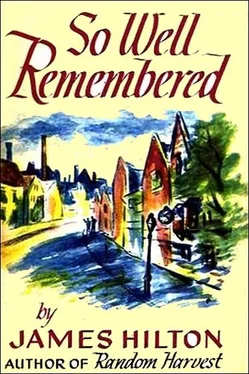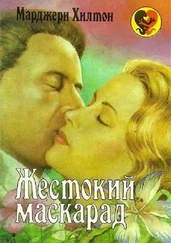Джеймс Хилтон - So Well Remembered
Здесь есть возможность читать онлайн «Джеймс Хилтон - So Well Remembered» весь текст электронной книги совершенно бесплатно (целиком полную версию без сокращений). В некоторых случаях можно слушать аудио, скачать через торрент в формате fb2 и присутствует краткое содержание. Год выпуска: 1945, Жанр: Проза, на английском языке. Описание произведения, (предисловие) а так же отзывы посетителей доступны на портале библиотеки ЛибКат.
- Название:So Well Remembered
- Автор:
- Жанр:
- Год:1945
- ISBN:нет данных
- Рейтинг книги:5 / 5. Голосов: 1
-
Избранное:Добавить в избранное
- Отзывы:
-
Ваша оценка:
- 100
- 1
- 2
- 3
- 4
- 5
So Well Remembered: краткое содержание, описание и аннотация
Предлагаем к чтению аннотацию, описание, краткое содержание или предисловие (зависит от того, что написал сам автор книги «So Well Remembered»). Если вы не нашли необходимую информацию о книге — напишите в комментариях, мы постараемся отыскать её.
So Well Remembered — читать онлайн бесплатно полную книгу (весь текст) целиком
Ниже представлен текст книги, разбитый по страницам. Система сохранения места последней прочитанной страницы, позволяет с удобством читать онлайн бесплатно книгу «So Well Remembered», без необходимости каждый раз заново искать на чём Вы остановились. Поставьте закладку, и сможете в любой момент перейти на страницу, на которой закончили чтение.
Интервал:
Закладка:
“I do know some, so I will ask ‘em.”
“And then tell me? Well, anyhow, you can imagine that sort of remark didn’t do her husband any good professionally.”
“Aye, I can see that.”
They were still at the kerbside, but a Government car had driven up and the chauffeur was waiting. Millbay said hastily: “Sorry there hasn’t been more time to talk. Always interesting to compare notes about people one knows… Incidentally, if you’re free tonight, why don’t you dine with me? Then we’d have more time.”
George was free and accepted, though not without a misgiving that grew and crystallized during the afternoon into a determination to pursue a certain course of action if Millbay should make it necessary. Before they were halfway through the meal, at a service flat in Smith Square, Millbay HAD made it necessary. They had discussed general topics at first, but then Millbay had continued: “You know, Boswell, I’m still a bit curious about Livia Winslow. She always rather fascinated me, in a sort of way, and to meet someone else who knew her… well, I suppose it’s the novelist in me cropping up again, even though it’s years since I last published anything. And I certainly don’t intend to publish anything you tell me, so don’t worry.”
“Anything I tell you?”
“Yes—if you feel like it. I wish you would.”
“About what?”
“About Livia… that is, of course, unless you’d rather not discuss her.”
George then said what he had made up his mind to say if this situation should arise. He said: “I don’t mind discussing her, but I’d better tell you something in advance. I was once married to her.”
“GOOD GOD! You don’t say?”
Till then George had felt slightly uncomfortable, but now, relaxed by his own candour, he could almost enjoy the other’s unbounded astonishment. He grinned across the table. “I dunno why I felt I had to tell you, but now I have done, I hope you’ll go ahead and give me any more news you have about her.”
“So you’re just as interested as I am?”
“Probably. That’s rather natural, isn’t it?”
“You haven’t kept in touch with her at all?”
“No—not since…” He left the sentence unfinished.
“And that was—when?”
“September First, Nineteen-Twenty-One.”
“Well remembered, eh?”
George nodded.
Millbay gave him a slow, shrewd glance, then continued: “Jeffrey happens to be a friend of mine… Would you like me to talk about his marriage?”
“Aye—if YOU feel like it.”
“And you won’t mind if I’m frank?”
“We’d both be wasting our time if you weren’t, wouldn’t we?”
“Glad you think so. And in exchange will you give me your own frank opinion… afterwards?”
George smiled. “Nay, I’ll not promise that. Let’s hear your story first.”
I first met Jeffrey Winslow, Millbay said, in connection with the Kemalpan affair. I don’t suppose you heard much about that. It didn’t get publicized. Things like it are always apt to happen, and to happen with the same declension of eventfulness—that is to say, they begin excitingly —bloodshed in the jungle, perhaps—and end a year or so later with quiet voices pronouncing judgment across some departmental desk-top in Whitehall. Mine was one of the quiet voices; I had all the papers relating to the affair before me, and I’d given several days to the most careful study of them. After all, you don’t squash a man’s career without good reason, especially if he belongs to a family like the Winslows. I was as tactful as I could be. I rather liked the look of the fellow from the outset; he was neither truculent nor obsequious, and heaven knows he could have been either. He just sat at the other side of the desk—a little nervous, as was natural; he answered questions briefly and clearly, and there was a pleasant ring in his voice that I would have taken for sincerity had not the circumstances of the moment put doubts in my mind.
Of course the Kemalpan affair needs some explanation—that is, if you don’t already know about it. (George said he didn’t.) Oh, well, I can put it in a few sentences. Kemalpan is a technically independent Sultanate that the British Government has a treaty with; Jeffrey Winslow was adviser to the Sultan on matters connected with imperial relations—somewhat of a nebulous job, but semi-diplomatic, with tentacles reaching into commercial and military spheres. Decidedly no plum—but not badly paid, and easy enough, as a rule, if you didn’t mind burying yourself in a place like Kemalpan. That, I should add, is the name of the capital city as well as of the state; the capital is inland, in the midst of jungle and rubber plantations; Winslow preferred to live with his wife at a settlement on the coast fifty miles away—healthier there, or so he reckoned. There’s a telegraph line between the coast and the capital, and a sort of rough trail that you can drive over in a Ford—but no good roads, no railway, and in those days no air line. These details are important in view of what happened. Also I should add that a small colony of British and Dutch rubber planters lived on their estates near the inland capital, and were on good terms with the Sultan, whose subjects they employed. The Sultan didn’t mind low wages for the tappers so long as he got a cut of the plantation profits —which he did, more or less, in the form of thoroughly legalized taxation. Quite a nice set-up as long as it lasted, and it lasted throughout the twenties, when rubber rose to four shillings a pound; but later the fall to sixpence led to labour troubles, and by the mid-thirties these had reached danger-point. All this is necessary to give the background to what happened in October ‘thirty-four, when an insurrection in the capital threatened to depose the Sultan in favour of some native ‘leader’ whom the planters called a Communist—it’s a conditioned reflex, you know. But it was true that the plantations couldn’t pay higher wages without going bankrupt, and equally true that the mob was in a mood to overthrow things if the millennium didn’t appear overnight. The Sultan, who was a sly old debauchee with no real interest in life but graft and women, rapidly slipped into panic; meanwhile the planters with their wives and families moved in from outlying districts to seek protection in the royal palace—protection being a few hundred of the Sultan’s private army, poor in quality and doubtful in allegiance.
The crisis developed within a matter of hours, while the Winslows were at their home on the coast; Winslow wired the news to London, which was part of his job, and was told to await instructions. A day later those instructions were sent. He was told to assure the Sultan that the British Government would back him to the full in suppressing the revolt, and that therefore the capital must be held at all costs until such assistance was forthcoming…
Now this was the point. Those instructions were SENT, and we had evidence later that they reached the coast settlement where Winslow lived; but he swore he never got them. Thus he didn’t give the Sultan any assurance of British help and the Sultan promptly gave in to the rebels. There followed a nasty little affray at the palace in which three white men and two white women were butchered. Well, that was the Kemalpan affair… nothing very remarkable, but thoroughly reprehensible from every official standpoint, and a year later we were still holding enquiries about it in Whitehall, still collecting more evidence that the instructions to Winslow had actually been transmitted and must have been received by him, though he still swore that they hadn’t.
A further point cropped up: the telegraph line from the coast to the inland capital had been cut, so that if Winslow HAD received his orders he could only have properly obeyed them by making the fifty-mile trip in person over the rough trail; and this, with most of the intervening country in the hands of the rebels, might not have been so safe. In fact, it might have been decidedly unsafe—which was why he couldn’t have relied on anyone else to do the job. So you see where all this is leading… and where it had already led on that foggy Friday in November ‘thirty-five when I first talked to the fellow in my office. Was his denial of having received instructions just the only thing he could think of as an excuse for having been scared? If that were the true interpretation, it added up to something rather serious.
Читать дальшеИнтервал:
Закладка:
Похожие книги на «So Well Remembered»
Представляем Вашему вниманию похожие книги на «So Well Remembered» списком для выбора. Мы отобрали схожую по названию и смыслу литературу в надежде предоставить читателям больше вариантов отыскать новые, интересные, ещё непрочитанные произведения.
Обсуждение, отзывы о книге «So Well Remembered» и просто собственные мнения читателей. Оставьте ваши комментарии, напишите, что Вы думаете о произведении, его смысле или главных героях. Укажите что конкретно понравилось, а что нет, и почему Вы так считаете.










